‘The Pink Cloud’ ponders questions of perspective
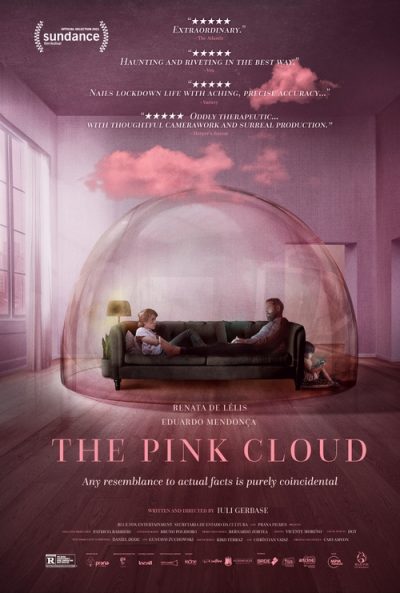
“The Pink Cloud” (“A Nuvem Rosa”) (2021). Cast: Renata de Lélis, Eduardo Mendonça, Helena Becker, Kaya Rodrigues, Girley Brasil Paes, Gabriel Eringer, Lívia Perrone Pires. Director: Iuli Gerbase. Screenplay: Iuli Gerbase. Web site. Trailer.
Is it possible to see the “same” situation in two different ways? That’s an age-old question that’s been debated for eons by philosophers, theologians and even quibbling parents, each claiming that their view was “right.” But who’s to say that anyone is “wrong” in these quarrels? Maybe everyone is “right” about what they perceive, each driven by his or her individual beliefs. It’s a question brought up once again, this time in an unlikely context, as seen in the intriguing new Brazilian sci-fi offering, “The Pink Cloud” (“A Nuvem Rosa”).
What if we were to face circumstances where an outside danger was forcing us to stay inside, cooped up in isolation for a prolonged period? Wouldn’t it be interesting to speculate about what might happen as a result of that? And how might we view it?
Hey wait – we’ve already done that.
Nevertheless, it’s intriguing to see how closely reality paralleled the ideas raised in this piece of cinematic speculative fiction, which was written in 2017 and filmed in 2019, before the COVID pandemic began. The timing of its release in 2021 couldn’t have been more ironic and synchronistic. It certainly gave the picture’s marketing people something unexpectedly relevant to work with, despite claims that any similarities between the film and actual events were purely coincidental.
In this story, a mysterious pink cloud suddenly begins appearing around the world. Despite its pastel beauty, it’s deadly, apparently containing toxic gases that kill quickly, within moments of exposure. Because of this, everyone is hurriedly corralled indoors, forced to either shelter in place or find the nearest available enclosed space, decisions to which little thought is given in light of the situation’s pressing immediacy. Many are trapped in places like supermarkets, often among strangers, with no idea how long they’ll be confined. One thing is for certain, though: Those who take these hasty steps to secure themselves are guaranteed to survive (at least initially) as chilling televised reports reveal just how fast one can succumb to the effects of the cloud.
The nature of the cloud and its projected duration are a complete mystery. However, it soon becomes apparent that it has remarkable persistence, and everyone must begin making preparations for these conditions for the long term. And this is true both for survival provisions as well as the relationships among those who suddenly find themselves sequestered with one another, some of whom may have little familiarity with their new domestic companions.
Such is the case with Giovana (Renata de Lélis) and Yago (Eduardo Mendonça), who met only the night before the cloud’s appearance. They attended a club, where they connected and struck up an attraction that led to a one-night stand at the home of Giovana’s mother. When morning came, however, as they leisurely chilled in hammocks on the house’s balcony, they heard warning sirens blare with announcements advising everyone to move indoors as quickly as possible. And, in no time, the virtual strangers found themselves in close quarters for an unknown duration.
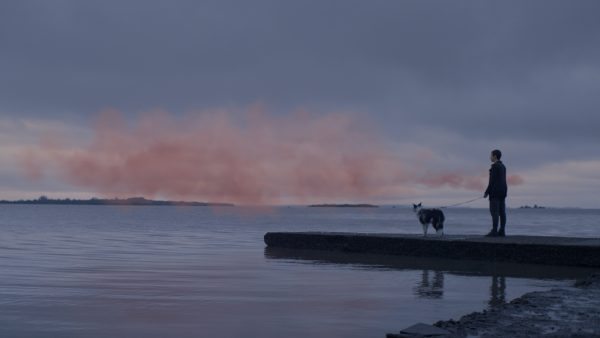
So what does one do under conditions like this? Well, considering that going outdoors would mean a death sentence, staying inside is the only viable option for anyone who doesn’t have a suicidal death wish. After taking an inventory of supplies and attending to other basic considerations, Giovana and Yago make video calls to check in with loved ones. Giovana calls her younger sister, Júlia (Helena Becker), who is attending a birthday party, and one of her friends, Sara (Kaya Rodrigues), who is home alone after her partner stepped out to visit a nearby bakery. Yago, meanwhile, calls his aging father, Rui (Girley Brasil Paes), who suffers from memory-related issues and is under the supervision of a live-in caretaker. They’re both concerned about the well-being of their family and friends, but, for now, keeping in touch is about all they can realistically do.
And so, after dealing with these initial adjustments to their routine, Giovana and Yago begin settling in to their new normal, unsure of what shape that will ultimately take. They attempt to address the issues that now present themselves, such as figuring out what course their relationship will take. Given how they met, it’s obvious there’s some degree of attraction between them, but is it enough to sustain them going forward, or were they just running on a surplus of hormones at the time? Do they share common goals for the future, or are they on different, potentially irreconcilable paths? Indeed, can they make this work?
Then there’s the question of grappling with long-term isolation and all of the attendant considerations that come with it, such as depression and other emotional issues. How well can each of them cope with being stuck within a limited number of walls? Granted they’re fortunate to be in Giovana’s mother’s well-appointed home, which offers an array of amenities and distractions, but will they be enough for the long term? And how well will the couple be able to cope with not having access to the big beautiful world just outside their windows, a view that ever tempts them to venture outdoors despite the known perils associated with that?
As the years pass and the relationship becomes more solidified, even more profound questions enter the picture, such as the possibility of having children. What if Giovana and Yago aren’t on the same page about this? But what if children arrive anyway? Then what? How will the presence of another being in the household affect the balance of things? And what would children bring to the table, especially since they might have to spend their entire lives confined indoors?
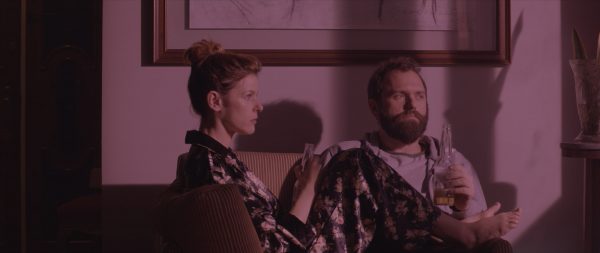
These are among the issues that Giovana and Yago must face. As daunting as those who lived through the pandemic came to view their circumstances, they pale in comparison to what those in the world of the pink cloud must wrestle with. The prospect of having to endure such conditions for years is probably unfathomable to most of us, but that’s what the residents of this new existence are saddled with, and we can’t help but wonder how they’ll manage. This truly becomes a case of life being what we make it. But the big question here is, what will they create?
The closer one looks at this story, the more one sees that there’s much more going on than simply protecting oneself from a deadly threat. But, for the protagonists, understanding that may take some doing, including having to endure the circumstances for a time to realize what’s actually transpiring. And, on this point, the narrative here parallels what has happened in real life even more than what one might initially think.
In shaping their new lives together, Giovana and Yago draw on their beliefs in manifesting their own versions of what constitutes their new normal. That’s important to recognize, given that our beliefs are responsible for materializing our reality, the product of the conscious creation process, the philosophy that maintains we draw upon these resources in framing our existence. And, considering that the protagonists are in many ways starting with a blank slate, they can aim for whatever they want, depending on whatever beliefs they have in place.
Much of the time, many of us tend to look upon this process in a somewhat piecemeal fashion, examining the manifestation of each of the components that make up the reality we experience. But, in this case, it’s hard to ignore the fact that Giovana and Yago are essentially rebuilding the totality of their existence, including the overarching qualities that characterize it. In that sense, then, they’re each actually materializing a template upon which all of their individual manifestations rest. Their templates are based on the perspectives they each embrace for their new reality, outlooks that are shaped by amalgamations of various beliefs, which, in turn, provide an underlying pattern for the creation of their new reality.
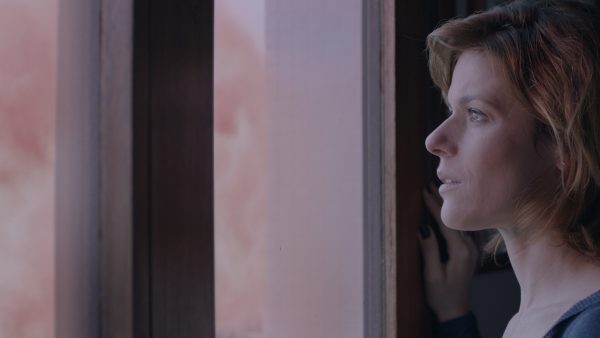
Cryptic though that may sound, we can actually look at our own experience to see how it’s reflected in the narrative of this film. Think of how many different ways life has changed as a result of the COVID pandemic. Remote working, for example, has become far more widely employed and accepted than previously. Breadwinners have become much more attuned to creating better work/life balances than in pre-pandemic times. Cocooning has replaced going out as a way of life for many individuals who were once social butterflies. The implementation of these changes wasn’t aggressively sought when they weren’t seen as necessary, but, when conditions changed, individuals embraced them, and their adoption resulted from wide-ranging changes in perspective underlying them (i.e., the new template).
As the story in “The Pink Cloud” plays out, we see the same happening to Giovana and Yago. After addressing basic needs like survival, through which they become more proficient as creative problem-solvers and learn how to overcome fears and limitations, they begin to assess what they want out of life as they settle in to their new routines. They each need to decide how they want to characterize them, figuring out which qualities they want to dominate. And, even though they’re in this situation together, they each have their own views of what they want, which means that they don’t necessarily share the same prevailing outlooks.
When an event like this occurs, there’s a fundamental sense of loss associated with it. The key to adapting, however, depends on how we see it. In many ways, this comes down to the question, is the glass half empty or half full? The half empty analogy no doubt arises from things like the inability to go outside and to interact with other people. It’s disappointing, to be sure, especially for those who have become accustomed to such activities. On the other hand, there’s the half full perspective, which rests on gratitude for things like one’s health, safety and continued existence in light of the prevailing circumstances. This view represents a basic appreciation for what one has, not what one lacks.
In light of what Giovana and Yago are up against, which of these perspectives is likely to offer a better chance of coping with the situation at hand? This is a lesson for them, just as it was for many of us with the onset of the COVID pandemic. The scenario thus operates as a refresher on the value of gratitude and appreciation, concepts that many of us lost sight of in a world that had grown selfishly obsessed with the notion of satisfaction on demand. When we have whatever we want, whenever we want it, we can grow unappreciative of what we do have while lamenting that which we don’t have (and that we can probably get along without just fine). Sometimes, though, it takes conditions like this to rediscover that lost awareness, and this film’s narrative provides us with a poignant reminder.
A key to grasping the foregoing rests with an ability to know when to let go, a point driven home at multiple times and in multiple ways during the film. Holding on when letting go would suit us better can be a hard choice, one that’s difficult to embrace palatable beliefs about. This is perhaps most obvious when it comes to holding out hope for being able to return outdoors, but there are even more painful choices to be considered. This becomes apparent, for example, when Giovana and Yago must come to terms with their level of ongoing contact with Júlia, Sara and Rui. Indeed, what’s one realistically to do when there’s essentially nothing to be done? How will one’s perspective be affected when false hope is allowed to continue to hold sway, particularly in situations where doing so accomplishes nothing? And, in turn, what impact would this have on one’s resulting reality?
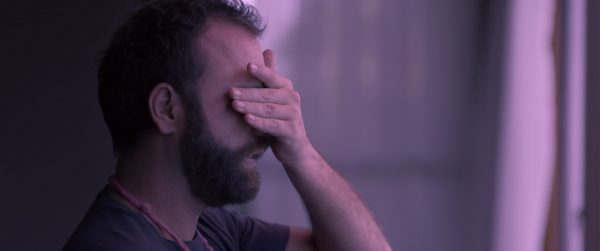
In these regards, “The Pink Cloud” is more than an intriguing work of science fiction or a remarkably prescient depiction of recent everyday life. It delivers thoughtful insights on the nature and qualities of existence. It helps us see what makes life worth living, including under conditions of great duress. And it helps us to decide how we wish to approach it – or whether we even want to do so.
Director Iuli Gerbase is off to a great start in this debut feature. This Brazilian offering handily surpasses its sci-fi roots in its exploration of a host of philosophical, metaphysical and moral issues, such as acceptance of our circumstances, knowing when to let go and developing appreciation for what we have, even in the absence of what we’ve lost. Its gorgeous cinematography and pastel-dominated art direction give the film an ironically loving look, one that comes in stark contrast to the perpetually deadly threat that awaits on the other side of the windows. Admittedly, the film suffers from occasional pacing issues (especially in the second half), as well as some repetitiveness in certain aspects of the screenplay/narrative. Nevertheless, this release has much to say, not only about what we’ve experienced, but also in terms of what we should consider taking away from it – a message that we must remember was crafted before our recent circumstances materialized. The film is available for streaming online.
In watching this film, one might wonder how something so beautiful as the pink cloud could be quite so menacing. We’ve all no doubt witnessed gorgeous sunrises and sunsets where the skies have been filled with wisps in such gorgeous hues, and, through these experiences, we’ve never questioned the beauty that Nature has sent our way. So why should this instance be any different? Well, in a way, perhaps it’s not; perhaps the beauty here lies in the message accompanying this phenomenon, one intended to nudge us into a greater sense of appreciation and gratitude. It may be delivered in a seemingly backhanded way, but it’s nevertheless a case of the Universe practicing tough love for us, behaving as if it’s a stern parent trying to impress a message upon us that we’ve been unable or unwilling to grasp but that we truly need to hear. We should be grateful for that in and of itself. But, if nothing else, we can only hope that we have the awareness to see the wisdom that’s being imparted – and to make it the priority in our lives that it truly deserves to be.
Copyright © 2022, by Brent Marchant. All rights reserved.



